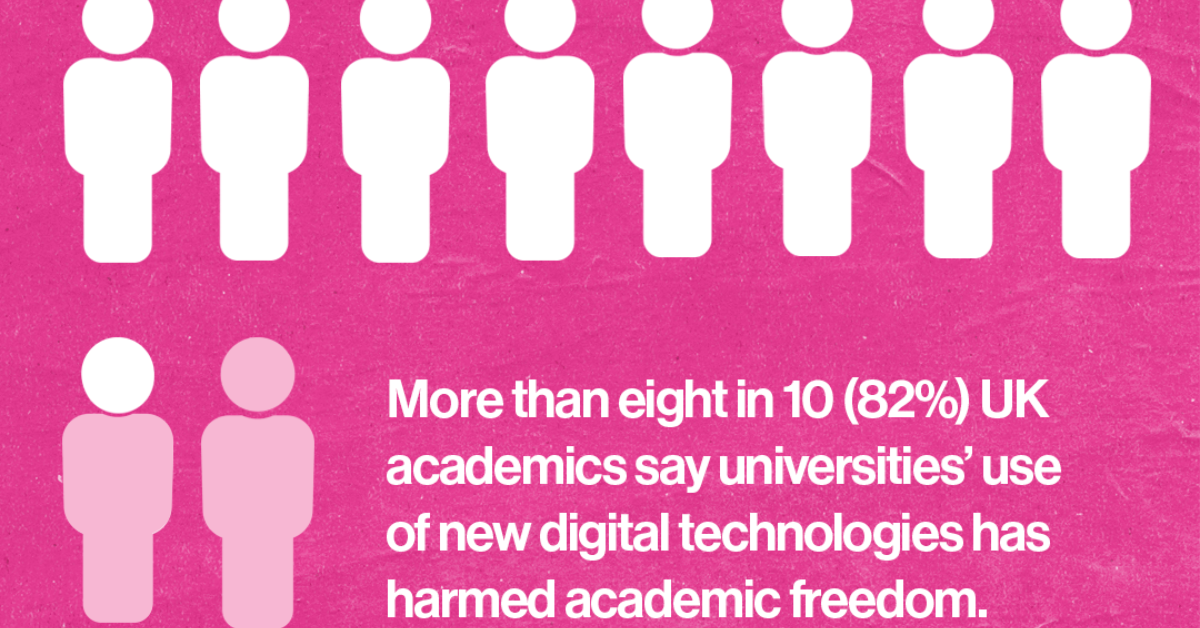
Survey shows 'panopticon like' digital management techniques are harming academic freedom
7 May 2024
More than eight in 10 (82%) UK academics say universities' excessive use of digital technologies has harmed academic freedom.
The finding comes from a new report, 'Academic Freedom in the Digital University', which also shows that most UK academics (58%) believe academic freedom has declined in recent years.
The report adds to the debate on academic freedom after the government issued new guidance for universities on free speech and Science Secretary Michelle Donelan attacked university researchers' social media posts. The authors, Chavan Kissoon and Prof. Terence Karran, argue that institutions increasingly use digital tools to monitor and manage the performance of staff and that this erodes academic freedom by constraining teaching and research [NOTE 1].
The report, based on a survey of over 2,000 UK academics, shows most believe that:
- digitally-enabled changes to universities' performance management practices over the last decade have led to reduced academic freedom (82.4% agree/strongly agree)
- the ways in which universities use digitally-enabled measurements of the student experience have led to reduced academic freedom (83.8% agree/ strongly agree)
- protection for academic freedom is in decline (58.2% agree/strongly agree)
- employment protection is in decline (72.1% agree/strongly agree).
The report makes the following recommendations so that academic freedom can be protected at UK universities:
- stakeholders need to recognise that digital technology shapes academic freedom by enabling new forms of employee monitoring and performance management
- universities should collaborate with their workplace unions to establish policies and principles that best ensure the ethical use of digital systems
- universities should be transparent with unions and academic staff over the monitoring and performance management functionality of digital systems
- universities should commit to conducting detailed 'Technology Impact Assessments' before purchasing and implementing new technologies.
The recommendations add to UCU's work in fighting the erosion of academic freedom, including its 2017 report highlighting the low levels of protection for academic freedom in the UK. This led the United Nations Educational, Scientific and Cultural Organization (UNESCO) and the International Labour Organisation expert group to call on the UK government to address job insecurity in higher education.
UCU general secretary Jo Grady said: 'This crucial report shows that universities are increasingly using digital technologies to surveil, record and scrutinise staff, and that this is corroding academic freedom.
'All too often the terms of debate on academic freedom are dictated by right-wing culture warriors, neglecting the day-to-day reality of university staff having their ability to research and teach freely eroded by panopticon-like digital management systems.
'This report is a gift to the sector and universities now need to work with us to enact its recommendations, protect academic freedom and support world leading research and teaching.'
Notes
[1] These include technologies such as Elsevier's SciVal, Scopus and Pure, which enable institutions to continuously monitor researcher productivity. Most institutional technologies capture user engagement data, and to varying extents make use of this surveillance data within data dashboards that rank performance.
Anthology Illuminate captures all user activity on the Blackboard Virtual Learning Environment and mines this data to inform reports on all user activity.
Social media monitoring tools, such as Pulsar's social listening and brand reputation management products enable universities to use keywords to identify, track and understand the ways in which they are being discussed across a range of online platforms, and to take actions to protect their brand.
- PrintPrint this page
- Share


